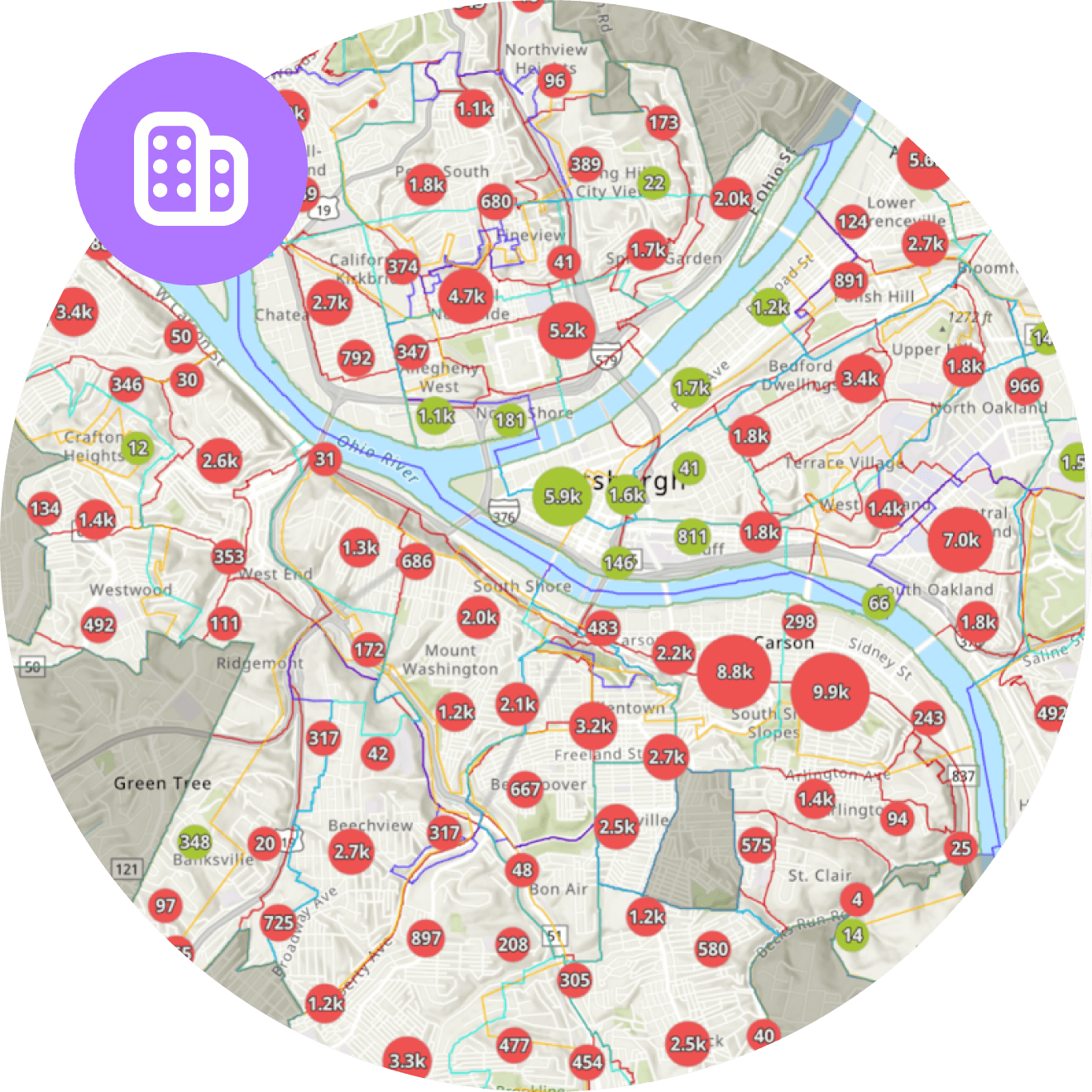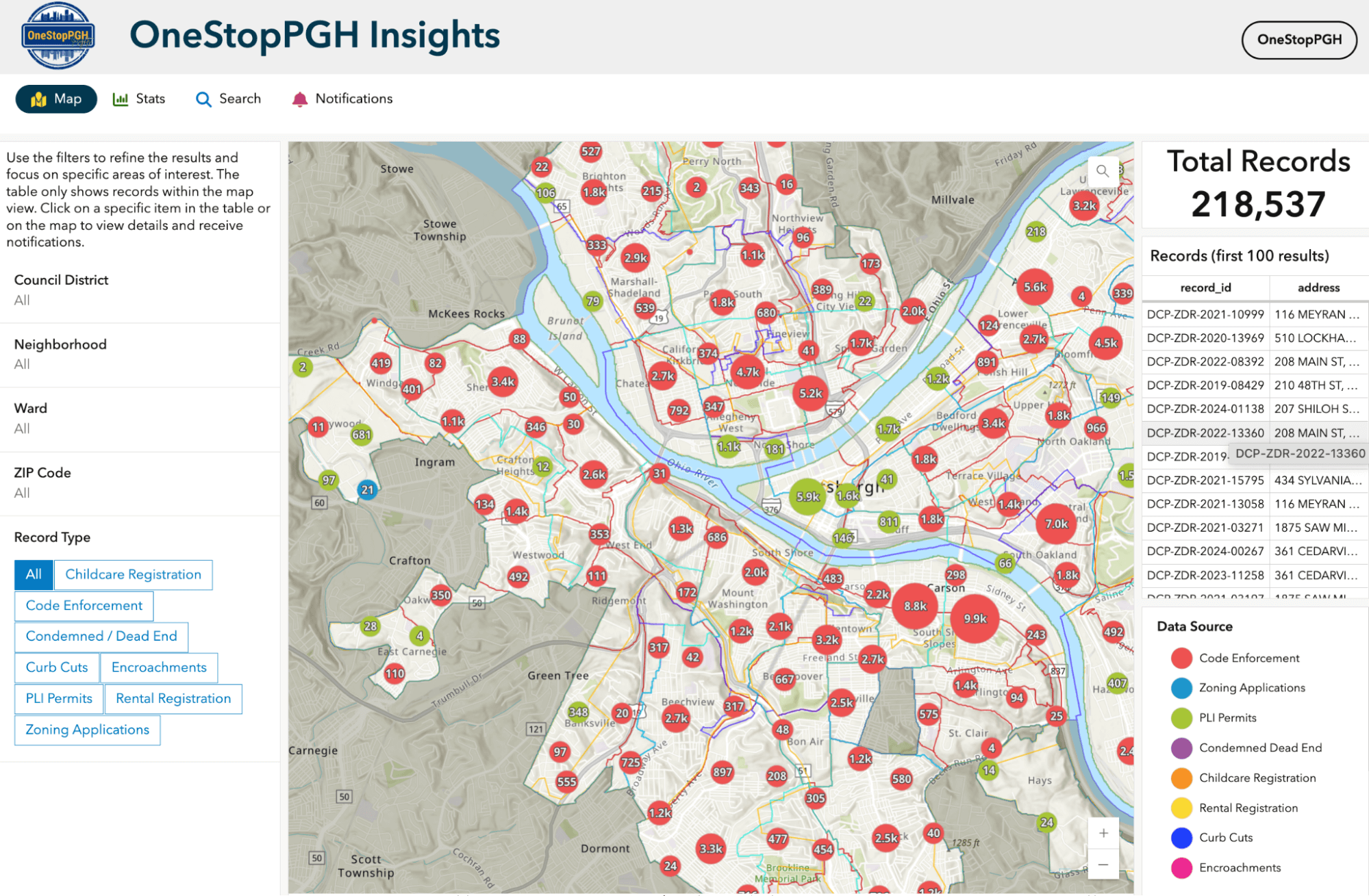Public Data as Civic Infrastructure: A Building Block in Pittsburgh's Tech Transformation, Powered by Astro
As Pittsburgh redefines itself as a modern tech hub, a small government team rebuilt its pipelines—not with steel and concrete, but with code.

>4M
30+
1
The Customer
Pittsburgh is a city of neighborhoods, each with its own story. From Bloomfield to the South Side, from Shadyside to Homewood, its residents want to know what’s happening next door — who’s building, what’s being repaired, and whether safety codes are being followed. Some call it being “nebby” in the local vernacular. But Pittsburghers care deeply about their communities and want to see them thrive.
At the center of Pittsburgh’s data transformation is Chris Belasco, Chief Data Officer, and his Data Services Team within the Department of Innovation and Performance. This small but resourceful team serves as the city’s central data engineering group—designing, building, and operating data pipelines that deliver transparency, operational efficiency, and smarter city services. As Chris puts it, “Our job is to build the connective tissue that lets city departments focus on helping residents, not manage data infrastructure.”
The Challenge
In Pittsburgh, where the Allegheny meets the Monongahela and steel production once defined the skyline, a quieter but no less vital revolution is underway — invisible to the eye but essential to the workings of a modern city. The City’s public data pipelines — not of water or gas, but of information — had grown brittle. Google Cloud Composer, their existing pipeline orchestrator, crumbled under the weight of expanding demands. Routine upgrades turned into endurance trials. Broken configurations drained precious time from a team too small to waste it.
“Reconfiguring an Airflow instance used to turn into a mini project that ate days of our time. We needed that time back to focus on the work that mattered.” Senior Data Engineer
The tipping point came with the initiation of a bold new project: OneStopPGH Insights, a tool that would give residents and departments unprecedented visibility into city permits and code enforcement data.
To meet the demands of this new era, they needed a foundation as solid as the bridges that span their rivers. A Senior Data Engineer on the Data Services Team saw the writing on the wall. “We’re not going to do this on our old stack,” he said. “It would have required weeks of fragile configurations and manual fixes — and we simply didn’t have time for that.”
The Solution
Before a single line of code was migrated, Chris Belasco stood before the City Council and the Mayor to make the case for change. He explained the hours wasted rebuilding Composer instances, the fragility of their current pipelines, and the growing expectations from residents for transparency. More importantly, he painted a picture of a government that could move faster, serve better, and build civic trust — if only it had the right foundation.
They found it in Astro.
As OneStopPGH Insights took shape, with deadlines looming and pipelines multiplying, Astro became their ally — a unified data orchestration platform, a managed control plane, and a streamlined path through complexity. Upgrades to Airflow 2.x no longer brought dread. Visibility across environments became the norm, not the exception.
The team migrated critical permit data pipelines to Astro, where they found stability and scale. And the work didn’t stop there: 311 service data, police time tracking workflows, and countless other datasets found a home in this new foundation.
“Astro took away the headaches of Airflow configuration and gave us the visibility and control we needed to keep critical public data pipelines running smoothly.” Chris Belasco Chief Data Officer
Opening the City’s Data to Its People
OneStopPGH Insights, a real-time window into the workings of city government, enables residents to explore neighborhood development permits, code violations, and zoning applications with a few clicks. It empowers community groups to track nuisances in their neighborhoods, helps departments prioritize enforcement actions, and invites the public to hold their government accountable.

Future updates will expand the tool’s reach — adding construction permits, paving schedules, and right-of-way obstructions. Transparency, once hidden beneath layers of bureaucracy, is now mapped and searchable.
“Almost everything we publish on our open data portal runs through Astro. It’s how we make Pittsburgh’s data work for the public.” Alida Laney Data Engineer
The Results
The transformation didn’t arrive overnight and it wasn’t marked by fanfare. It showed up quietly — in dashboards that loaded each morning without fail, in permits filed on time, in service requests that no longer fell through the cracks. Stability replaced fragility; clarity replaced confusion. From the marble halls of the City-County Building to the neighborhood streets where people live and work, Pittsburgh’s data had found its footing.
Astro delivered results that mattered:
Increasing Reliability & Reducing Risk: Gone were the pipeline failures that left agencies guessing; in their place, dependable data flows and restored confidence.
Improving Operational Efficiency: Airflow upgrades, once a source of dread, became routine. What was once firefighting became maintenance.
Governance at Scale: Departments that had once built their own brittle solutions now operated on a unified orchestration layer — no more silos, no more duplication.
Innovating Faster: With data flowing freely and reliably, the City laid the groundwork for smarter services, faster responses to neighborhood concerns, and a public that could see what its government was doing — and hold it accountable.
“With Astro, we don’t spend our time on Airflow configuration anymore. We focus on delivering data products that make a difference.” Senior Data Engineer
What’s Next
The work is far from over. In the coming months, Pittsburgh’s Data Services Team will extend Astro’s reach into new corners of city government — from public safety to finance — bringing transparency to new datasets and reliability to more departments. They will build pipelines for incident reporting, automate budget data flows, and extend their reach into more systems — from legacy databases to new cloud platforms — ensuring every department’s data can move securely and efficiently.
Each new integration will be guided by the same clarity of purpose: to replace fragile, manual processes with durable, automated ones. To build a platform where growth doesn’t mean complexity. And to give Pittsburgh’s residents — whether they live on the South Side slopes or in the towers of downtown — confidence that their city’s data will work when they need it most.
“As new projects come up, Astro gives us the foundation to scale without adding complexity. It lets our small team support more departments with the same level of reliability.” Chris Belasco Chief Data Officer

Learn What Astronomer Can Do For You
OR
By proceeding you agree to our Privacy Policy, our Website Terms and to receive emails from Astronomer.
